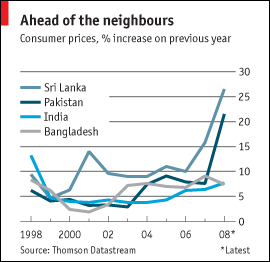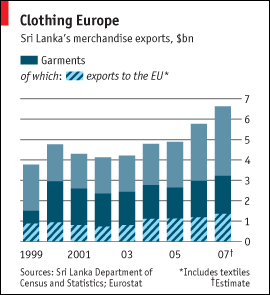Ilankai Tamil Sangam
Association of Tamils of Sri Lanka in the USA
Published by Sangam.org
Not Many Pluses
by The Economist, August 14, 2008
|
[T]here is a problem with the rules of GSP Plus. Beneficiaries must comply with 27 international conventions, on environmental, labour and human rights standards. And on the last of these, Sri Lanka is struggling. The agreement expires at the end of 2008...
According to an unpublished paper by economists at the University of Sussex, losing GSP Plus would lead to a 4% cut in Sri Lanka’s garment exports. Overall, it would cost 2% of GDP. |
AT A lingerie factory in Pannala, in Sri Lanka’s Western Province, lines of women in red work-coats, red headscarves and face-masks are stitching knickers. These garments, bound for British high streets, represent one of Sri Lanka’s strengths: an innovative garment industry, which accounts for 67% of total industrial output and the equivalent of 10% of GDP. The factory’s owner, MAS Holdings, Sri Lanka’s biggest garment-maker, employs 45,000 Sri Lankans, and had revenues of $700m last year.
 Seen from here, Sri Lanka’s big weakness—the 25-year war between the Liberation Tigers of Tamil Eelam (LTTE) and the government—might be in another country. It is waged mostly in the north and east, leaving the populous, well-off west largely unscathed. But this could change.
Seen from here, Sri Lanka’s big weakness—the 25-year war between the Liberation Tigers of Tamil Eelam (LTTE) and the government—might be in another country. It is waged mostly in the north and east, leaving the populous, well-off west largely unscathed. But this could change.
Under a concession known as “GSP Plus”, awarded in 2005 to help Sri Lanka rebuild after the 2004 tsunami, Sri Lankan exporters enjoy preferential tariff treatment from the EU. As a result, the EU is Sri Lanka ’s biggest export market, accounting for annual sales of around $1 billion; about half are covered by GSP Plus. But there is a problem with the rules of GSP Plus. Beneficiaries must comply with 27 international conventions, on environmental, labour and human rights standards. And on the last of these, Sri Lanka is struggling. The agreement expires at the end of 2008. Recent signs are that it will not be renewed.
Since launching a fresh campaign against the LTTE in 2006, the government has been accused of complicity in the abduction or murder of hundreds of Tamil and Muslim men. It is at war with human-rights groups. It has refused to let the UN High Commissioner for Human Rights set up an office in Sri Lanka. A much weaker alternative, a group of “eminent persons” from India, France, America and other countries, was sent to observe Sri Lanka’s own investigations into six high-profile abuses. But the group disbanded itself in April, citing a “lack of political will” to uncover the truth.
 A senior EU official familiar with Sri Lanka thinks it currently looks unlikely GSP Plus will be renewed. At a minimum, he suggested, the government would have to make real progress on a case in which 17 aid workers employed by a French NGO were killed in 2006, and another in which five high-school students were executed, allegedly by security forces, also in 2006. If the EU renewed the agreement without such progress, it might be challenged at the World Trade Organisation—as happened to an EU trade sop to Pakistan in 2004.
A senior EU official familiar with Sri Lanka thinks it currently looks unlikely GSP Plus will be renewed. At a minimum, he suggested, the government would have to make real progress on a case in which 17 aid workers employed by a French NGO were killed in 2006, and another in which five high-school students were executed, allegedly by security forces, also in 2006. If the EU renewed the agreement without such progress, it might be challenged at the World Trade Organisation—as happened to an EU trade sop to Pakistan in 2004.
According to an unpublished paper by economists at the University of Sussex, losing GSP Plus would lead to a 4% cut in Sri Lanka’s garment exports. Overall, it would cost 2% of GDP. MAS expects GSP Plus to go. To offset the increased costs this would entail, the company is looking for ways to cut other costs, such as by buying fabric in East Asia, not Sri Lanka or India.
But this comes at a bad time for Sri Lanka and its garment-makers. Annual inflation is close to 30%. The rupee has appreciated against the dollar, further hurting exporters. By one estimate, economic growth—which was 7.6% in 2006—will be 4.3% this year. As elsewhere, inflation is being driven by high food and energy prices. But in Sri Lanka, 25-year average annual inflation is 12%. Monetary policy has been too loose, in part to finance the war. Including the cost of resettling refugees, the war eats up around 30% of the government’s budget. Yet it insists that its military campaign, which most Sri Lankans support, has little effect on inflation, which they do not. If it loses GSP Plus, it will be even harder for the government to argue that the war has no economic downside.
© 1996-2025 Ilankai Tamil Sangam, USA, Inc.
 Seen from here, Sri Lanka’s big weakness—the 25-year war between the Liberation Tigers of Tamil Eelam (LTTE) and the government—might be in another country. It is waged mostly in the north and east, leaving the populous, well-off west largely unscathed. But this could change.
Seen from here, Sri Lanka’s big weakness—the 25-year war between the Liberation Tigers of Tamil Eelam (LTTE) and the government—might be in another country. It is waged mostly in the north and east, leaving the populous, well-off west largely unscathed. But this could change. A senior EU official familiar with Sri Lanka thinks it currently looks unlikely GSP Plus will be renewed. At a minimum, he suggested, the government would have to make real progress on a case in which 17 aid workers employed by a French NGO were killed in 2006, and another in which five high-school students were executed, allegedly by security forces, also in 2006. If the EU renewed the agreement without such progress, it might be challenged at the World Trade Organisation—as happened to an EU trade sop to Pakistan in 2004.
A senior EU official familiar with Sri Lanka thinks it currently looks unlikely GSP Plus will be renewed. At a minimum, he suggested, the government would have to make real progress on a case in which 17 aid workers employed by a French NGO were killed in 2006, and another in which five high-school students were executed, allegedly by security forces, also in 2006. If the EU renewed the agreement without such progress, it might be challenged at the World Trade Organisation—as happened to an EU trade sop to Pakistan in 2004.